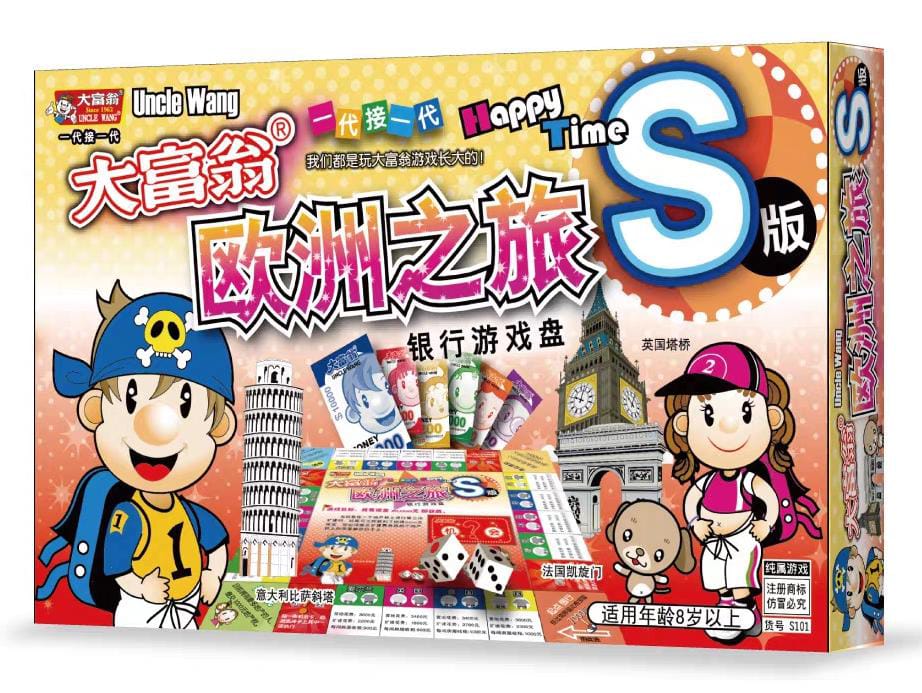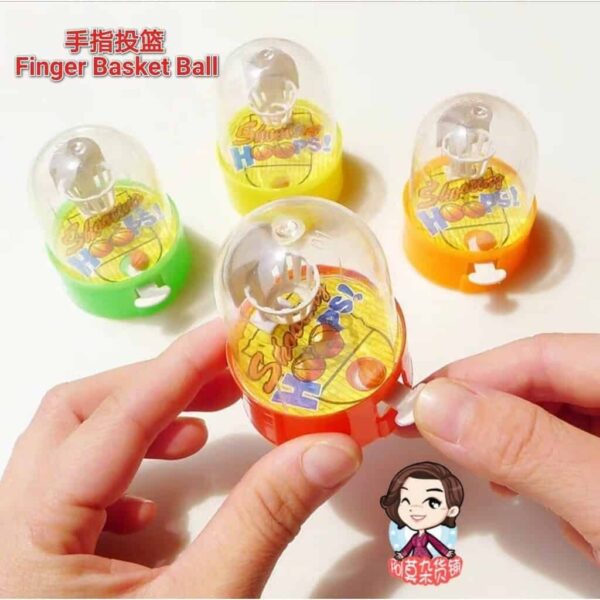Product Description
中文版:游戏介绍与详细玩法(欧洲之旅 S版)
一、游戏简介
“欧洲之旅 银行游戏盘 S版”是 “Uncle Wang 大富翁” 系列的一款主题版本,地图聚焦欧洲国家/城市,采用银行机制(银行作为中央资金管理)版型,标注为“S版”可能意味着“精简版”或“特别版”。玩家通过购置欧洲各地地产、建设、收租、交易、管理资金,最终目标是在游戏中成为资产最多或最后未破产者。
二、组件(典型)
-
棋盘:格子为欧洲多个国家/城市地标或景点。
-
起始资金:每位玩家初始获得一定金额纸币。
-
银行区:由一名玩家或专门角色担任银行,管理资金、地产卡、拍卖。
-
地产卡:对应棋盘上可购买的地产格子。
-
建筑物标志(如房屋、旅馆)或提升租金的机制。
-
机会/命运卡(或类似事件卡):玩家落在特定格子抽取并执行。
-
掷骰子或转盘决定移动数。
-
棋子/玩家标识。
-
纸币、说明书。
三、游戏目标
使自己在游戏结束时拥有最多资产(现金+地产+建筑物),或成为最后一位尚未破产的玩家。
四、游戏准备
-
将纸币、地产卡、事件卡、建筑物等组件准备齐全。
-
每位玩家从银行领取相同的起始资金(例如版说明可能是“1000 元”或类似金额,实际以盒内为准)。
-
地产卡依照棋盘标示准备好,放置于银行区。
-
指定一名玩家担任银行角色,负责管理资金、拍卖流程。
-
每位玩家选择一个棋子,放在“起点/出发”格。
五、游戏流程
-
轮流进行:玩家依顺时针顺序轮流行动。
-
掷骰子/转盘:玩家掷一颗或两颗骰子,或依据游戏版型使用转盘确定移动步数。
-
移动玩家棋子:根据点数向前移动相应格数。
-
落格处理:
-
若为未被购买的地产格:玩家可选择购买该地产,支付银行标示金额。若放弃购买,可由银行拍卖,其他玩家竞买。
-
若为已被他人拥有的地产格:玩家支付租金给拥有该地产的玩家,金额根据地产类型/建筑物情况而不同。
-
若为机会/命运/税收/监狱/公共事业等格:抽取事件卡或执行格子指示(如付税、抽卡、移动、停一回合等)。
-
-
建造与发展:若玩家拥有某一色组(例如欧洲某一国家或城市群)的全部地产,可在其上建造建筑物以提高租金(是否建造机制视 S 版具体规则)。
-
交易、抵押、破产:
-
玩家之间可交易地产、现金、卡牌等。
-
若玩家资金不足以支付租金或罚款,可将其地产抵押给银行或卖出建筑物获取现金。
-
若仍无法支付,则宣告破产,退出游戏,其资产按规则处理。
-
-
结束回合:玩家完成以上行动后,回合结束。若手上有超过规定张数或资金超过规定(如版上限制),按规则调整。
-
胜利判断:当只剩一名玩家未破产,或达到预设胜利条件(例如某玩家资产达到目标),游戏结束,资产最多者或最后存活者为胜。
六、S版特别提示
-
“S版”可能为简化版,适合家庭或孩子玩:可能棋盘较小、游戏时间缩短、起始资金较低。
-
银行游戏盘含有银行机制:强调资金管理、拍卖流程。
-
欧洲之旅主题意味着地产用欧洲城市代替中国城市/本土地标。
-
建议玩家人数一般为 2–6 人,适合年龄可能为 6岁以上。游戏时间可能在 20‑40 分钟左右。
-
玩法可视为经典大富翁机制的一种变体,若想增挑战,可加入“抢手卡”/“转盘”机制(若版上标示有该机制)。
English Version: Game Introduction & Detailed Rules (Europe Tour Bank Game Board S‑Edition)
1. Game Overview
The “Europe Tour – Bank Game Board S‑Edition” from the Uncle Wang Monopoly‑style series features a European cities theme and central banking mechanism. Players purchase properties, collect rent, build developments, trade assets, and aim to become the wealthiest or last standing player.
2. Components (Typical)
-
Game board: Squares depict various European cities or landmarks.
-
Player tokens: Each player chooses one.
-
Banknotes / currency and central Bank (managed by one designated player).
-
Property Title Deed cards for each purchasable square.
-
Houses / Hotels or equivalent building tokens (if applicable).
-
Chance / Event cards triggered by landing on special squares.
-
Dice or spinner for movement.
-
Banker role, rulebook.
3. Objective
Achieve the highest total assets (cash + properties + buildings) when the game ends, or be the last player still solvent.
4. Setup
-
Prepare banknotes, property cards, building pieces, event cards, and tokens.
-
Each player receives the same starting cash from the Bank (specific amount per S‑Edition rules).
-
Shuffle event cards and place them in the designated area.
-
Select one player as the Banker, who handles money, auctions, and property deeds.
-
All players place their tokens on the “Start” square.
5. Gameplay
-
Players take turns in sequence (clockwise).
-
Roll dice / spin to determine movement.
-
Move your token accordingly.
-
Landing action:
-
If landing on unowned property: you may buy it. If you decline, the Bank auctions it to all players.
-
If landing on someone else’s property: you pay rent to that owner (rent may be higher if buildings are present).
-
If landing on special squares (Chance, Tax, Jail, Utility etc.): draw an event card or follow the instructions.
-
-
Development: If you own all properties within a specific colour group (e.g., cities in one country or region), you may build houses/hotels (per S‑Edition rules) to increase rent value.
-
Trading & Financial Management:
-
Players may trade properties and money with each other.
-
If short of cash to pay, you may mortgage properties, remove building(s), or seek loan/trade.
-
If bankrupt (unable to pay), you’re out; your assets are managed as per rules.
-
-
End of Turn: When your actions are finished, end your turn. If you hold more cards or exceed any limits, adjust per the rules.
-
Winning the Game: The game ends when only one player remains or when a preset victory condition is met; the wealthiest or sole remaining player wins.
6. S‑Edition Specific Notes
-
The “S‑Edition” is likely a simplified version for quicker play or younger audiences (smaller board, reduced starting funds, shorter duration).
-
The bank game board emphasizes centralized banking and auctions.
-
The Europe Tour theme uses European cities/landmarks for properties, adding a thematic twist.
-
Typical players: 2–6; typical play time: ~20‑40 minutes; age recommended: approx. 6+.
-
If marked “S‑版”, “Q‑版”, “银牌”, etc., double‑check the components as they may differ slightly from classic editions (e.g., spinner vs dice, simplified property groups).







Reviews
There are no reviews yet.